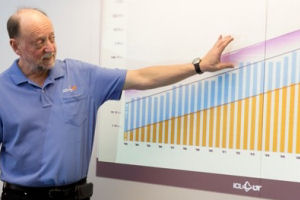Turing Fellow is recipient of the prestigious Ken Kennedy Award
22 Nov 2013
Professor Jack Dongarra has been awarded the Association of Computing Machinery and Institution of Electrical and Electronic Engineers Computer Society 2013 Ken Kennedy Award for “Software Technologies that Power Supercomputers to Tackle Big Scientific Problems”

The Award, one of the most prestigious in the field of Supercomputing, was officially presented at the opening of the SC13 Supercomputing Conference in Denver, Colorado on 19 November 2013.
Jack Dongarra is a University Distinguished Professor at the University of Tennessee's Department of Electrical Engineering and Computer Science. He is also a Distinguished Research Staff member in the Computer Science and Mathematics Division at Oak Ridge National Laboratory and an adjunct Professor in the Computer Science Department at Rice University. He holds the Turing Fellowship in the Schools of Computer Science and Mathematics here at the University. He is the founding director of the Innovative Computing Laboratory in UT's Computer Science Department, which engages in research in various areas of high-performance computing.
Citation
On presenting the Award, ACM President, Vint Cerf, cited Professor Dongarra's role in anticipating the staggering challenges facing the high performance computing world, "His innovations have contributed immensely to the steep growth of high performance computing and its ability to illuminate a wide range of scientific questions facing our society."
In an ACM interview after accepting the Award, Professor Dongarra was asked about his position at the University of Manchester, "I'm highly honoured to be named as the first Turing Fellow at the University of Manchester. The position is associated with the Mathematics and Computer Science Schools at the University. Alan Turing's work is felt in all areas of high performance computing research."
